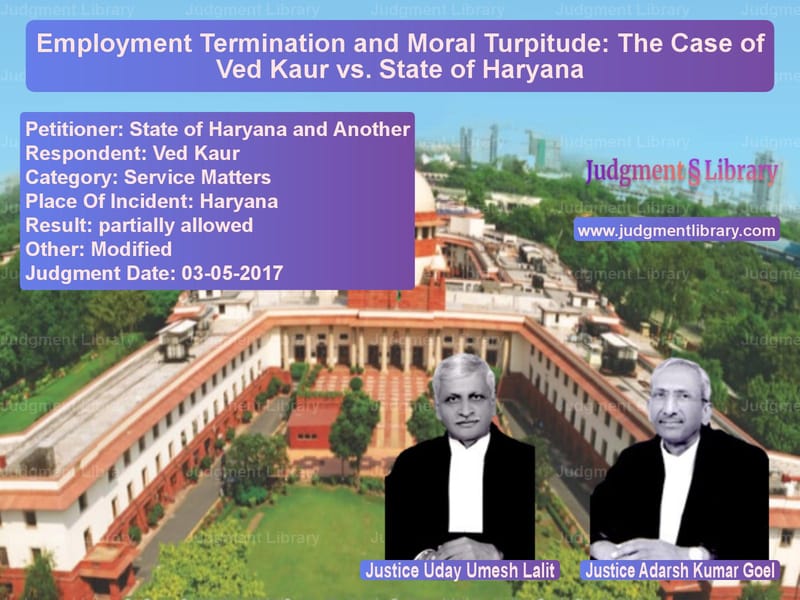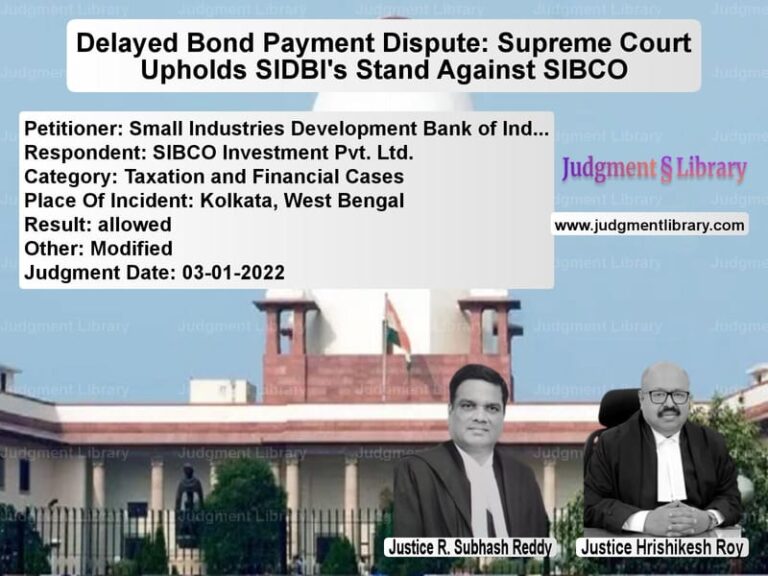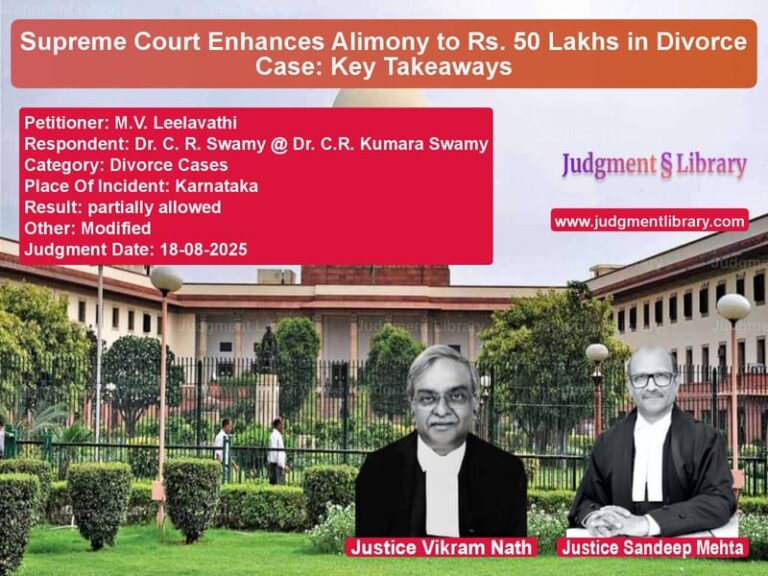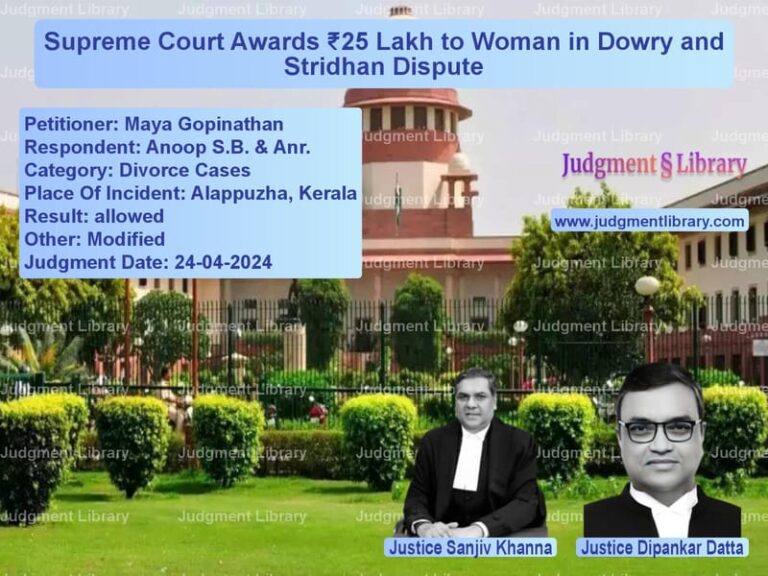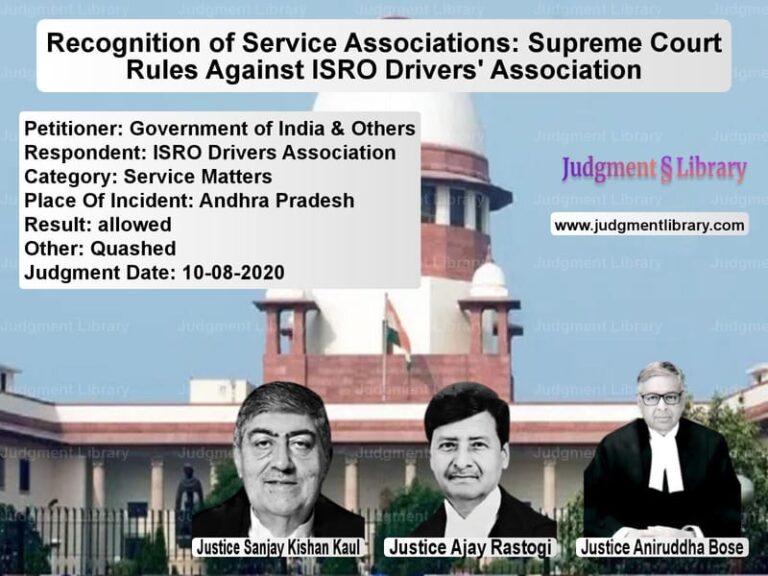Employment Termination and Moral Turpitude: The Case of Ved Kaur vs. State of Haryana
The case of State of Haryana and Another vs. Ved Kaur raises critical questions about employment termination on the grounds of moral turpitude. The Supreme Court’s judgment addresses the dismissal of Dharam Singh, a government teacher, following his conviction under Section 304 Part II of the Indian Penal Code (IPC). This judgment is particularly significant as it delves into whether an individual’s conviction should lead to automatic termination of service without an inquiry.
Background of the Case
Dharam Singh was employed as a Junior Basic Training (JBT) teacher in Haryana since October 1967. On 29.10.1994, he and two others were convicted under Section 304 Part II IPC and sentenced to four years of rigorous imprisonment. As a result, he was dismissed from service without an inquiry on 28.03.1995 on the grounds that his conviction amounted to moral turpitude.
While his appeal was pending, Dharam Singh passed away on 11.12.2002, leading to the abatement of his appeal. However, his co-accused were later acquitted of the serious charge under Section 304 Part II IPC and convicted under Section 323 IPC, a less serious offense. Since Dharam Singh’s role was identical to that of his co-accused, his widow, Ved Kaur, filed a claim seeking reinstatement of his service benefits.
Legal Arguments
Petitioner’s (Ved Kaur’s) Arguments
- Since Dharam Singh’s co-accused had been acquitted under Section 304 Part II IPC and convicted only under Section 323 IPC, which does not involve moral turpitude, the same consideration should apply to him.
- According to government instructions dated 26.03.1975, offenses that amount to moral turpitude are specifically listed, and Section 323 IPC is not among them.
- The dismissal was unjustified because no inquiry was conducted before terminating Dharam Singh’s employment.
- The State should reinstate Dharam Singh posthumously and release all service benefits due to him.
Respondent’s (State of Haryana’s) Arguments
- The State justified the dismissal by arguing that Dharam Singh had been convicted under a serious charge initially, which warranted his termination.
- The reconsideration of the case and subsequent rejection of the claim were legally valid.
- The government has discretion in determining what constitutes moral turpitude and cannot be compelled to reinstate an employee posthumously.
Key Observations of the Supreme Court
The Supreme Court extensively analyzed the issue of moral turpitude and the impact of acquittal of the co-accused. It relied on previous cases, including Pawan Kumar v. State of Haryana and State Bank of India v. Mohammed Abdul Rahim, to examine the standards for determining moral turpitude.
Defining Moral Turpitude
The Court cited government guidelines that define moral turpitude based on three factors:
- Whether the act shocks the moral conscience of society.
- Whether the motive was inherently base or depraved.
- Whether the individual involved should be viewed as having a depraved character.
The Supreme Court noted that Section 323 IPC (voluntarily causing hurt) is not included in the list of offenses considered as moral turpitude.
Comparing with Precedents
The Supreme Court referenced its earlier decision in Pawan Kumar v. State of Haryana, which had held that an individual’s conviction under an offense not listed in the government’s guidelines does not automatically disqualify them from government service.
Final Verdict
The Supreme Court partially allowed the appeal. It ruled that:
- Dharam Singh’s dismissal on the grounds of moral turpitude was unwarranted since Section 323 IPC is not classified as moral turpitude.
- His widow, Ved Kaur, was entitled to all consequential benefits, except for back wages, as Dharam Singh had already passed away.
- The benefits should be computed and released within two months.
Significance of the Judgment
This ruling reinforces the principle that not all convictions warrant dismissal from service. It emphasizes the importance of distinguishing between crimes that involve moral turpitude and those that do not. The judgment also highlights the necessity of conducting an inquiry before terminating government employees on the basis of criminal convictions.
Ultimately, this case serves as a precedent for fair employment practices and protects the rights of employees against arbitrary dismissal.
Don’t miss out on the full details! Download the complete judgment in PDF format below and gain valuable insights instantly!
Download Judgment: State of Haryana and vs Ved Kaur Supreme Court of India Judgment Dated 03-05-2017.pdf
Direct Downlaod Judgment: Direct downlaod this Judgment
See all petitions in Termination Cases
See all petitions in Disciplinary Proceedings
See all petitions in Employment Disputes
See all petitions in Judgment by Uday Umesh Lalit
See all petitions in Judgment by Adarsh Kumar Goel
See all petitions in partially allowed
See all petitions in Modified
See all petitions in supreme court of India judgments May 2017
See all petitions in 2017 judgments
See all posts in Service Matters Category
See all allowed petitions in Service Matters Category
See all Dismissed petitions in Service Matters Category
See all partially allowed petitions in Service Matters Category

